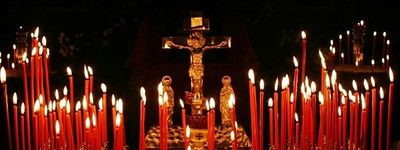

| Previous day | Next day |
| Old Style
March 16
|
Saturday |
New Style
March 29
|
|
4th Week of Great Lent. Fourth Saturday of Great Lent. Commemoration of the Dead.
Tone 6.
Great Lent. |
Wine and oil allowed.
|
![]() Martyr Sabinas of Hermopolis, Egypt (287).
Martyr Sabinas of Hermopolis, Egypt (287). ![]() Martyr Papas of Lycaonia (305-311).
Martyr Papas of Lycaonia (305-311).
Apostle Aristobulus of the Seventy, bishop of Britain (1st c.). Hieromartyr Alexander, pope of Rome (119). Martyr Julian of Anazarbus (4th c.). St. Serapion, archbishop of Novgorod (1516). Hieromartyrs Trophimus and Thalus, priests, of Laodicea (300). St. Pimen, fool-for-Christ, enlightener of the Dagestani, and his companion Anthony of Meskhi, Georgia (13th c.). St. Ambrose (Khelaia) the Confessor, catholicos of Georgia (1927). St. Eutropia of Kherson (1968).
St. Abban of Kilabban (Ireland) (650). Martyr Romanus at Parium on the Hellespont. St. Christodulus, wonderworker, of Patmos (1093). New Monk-martyr Malachi of Rhodes, at Jerusalem (1500).
Thoughts for Each Day of the Year
According to the Daily Church Readings from the Word of God
By St. Theophan the Recluse

Saturday. [Heb. 6:9–12; Mark 7:31–37]
Flesh and blood cannot inherit the Kingdom of God (I Cor. 15:50). Consequently, to receive the kingdom it is necessary to become fleshless and bloodless—that is, to become steadfast in such a nature of life wherein blood and flesh literally do not exist. This is attained by a complete renunciation of deeds that come from flesh and blood. Now the works of the flesh are manifest, which are these; Adultery, fornication, uncleanness, lasciviousness, idolatry, witchcraft, hatred, variance, emulations, wrath, strife, seditions, heresies, envyings, murders, drunkenness, revellings, and such like. Having listed all of these, the Apostle adds: I tell you before, as I have also told you in time past, that they which do such things shall not inherit the Kingdom of God (Gal. 5:19–21). He that has ears to hear, let him hear (cf. Matt. 11:15)!
Articles
 Martyr Sabinus of EgyptDuring a persecution of Christians under the emperor Diocletian (284-305), Saint Sabinus and some like-minded companions hid in a remote village. |
 Martyr Papas of LyconiaThe Holy Martyr Papas lived in the city of Laranda (Asia Minor) during the reign of Maximian (305-311). |
 Hieromartyr Alexander the Pope of RomeThe Hieromartyr Alexander, Bishop of Rome, served for ten years as the archpastor of Rome. |
 Martyr Julian of AnazarbusThe Hieromartyr Julian of Anazarbus suffered for Christ in Antioch, Syria under the emperor Maximian Galerius (305-311). |
 Hieromartyrs Trophimus and Thalus, priests, of LaodiceaThe Holy Martyrs Trophimus and Thallus, brothers and presbyters of Syria, served in Carian Laodicea. |
 Saturday of the Commemoration of the DeadSaturday of the Commemoration of the Dead |




